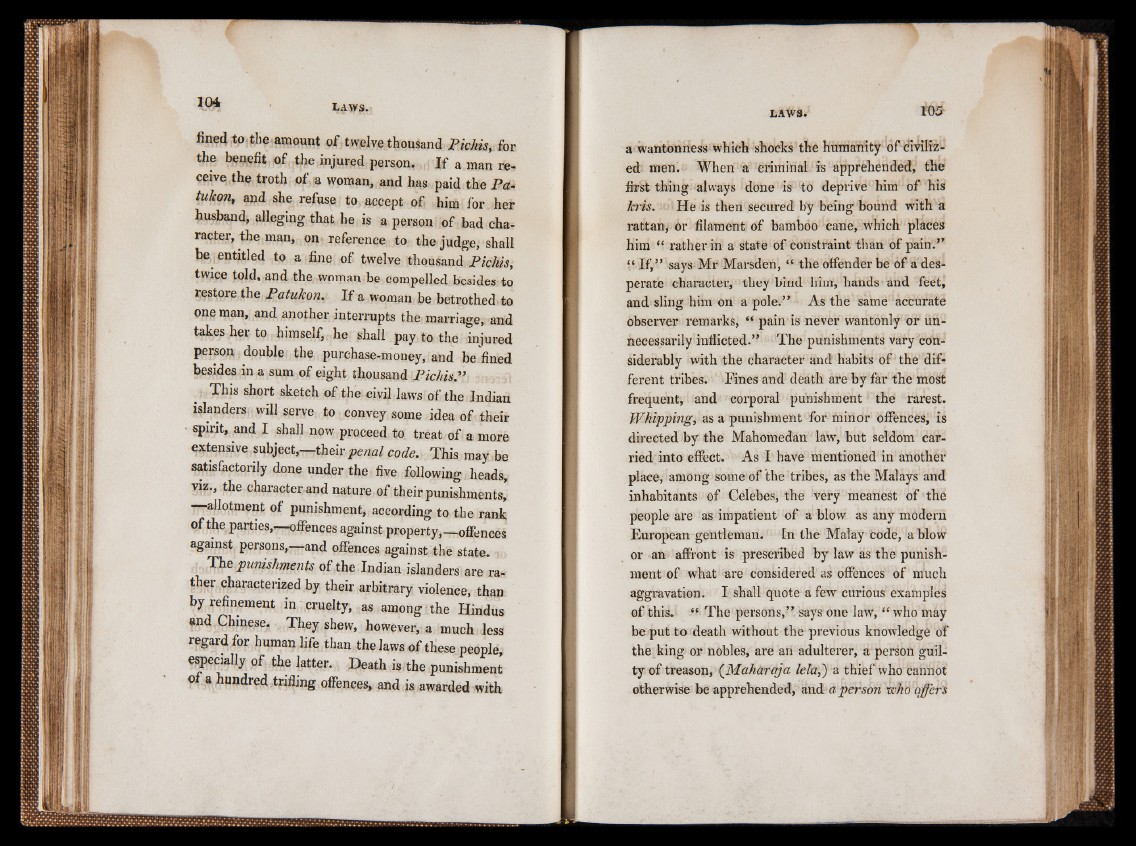
fined to the amount of twelve thousand Pichis, for
the benefit of the injured person. If a man receive
the troth of a woman, and has paid the Pa-
tukon> and she refuse to accept of him for her
husband, alleging that he is a person of bad character,
the man, on reference to the judge, shall
he entitled to a fine of twelve thousand Pichis,
twice told, and the woman be compelled besides to
restore the Patukon. If a woman be betrothed to
one man, and another interrupts the marriage, and
takes her to himself, he shall pay to the injured
person double the purchase-money, and be fined
besides in a sum of eight thousand Pichis.”
:This short sketch of the civil laws of the Indian
islanders will serve, to convey some idea of their
spirit, and I shall now proceed to treat of a more
extensive subject,—their penal code. This may be
satisfactorily done under the five following heads,
viz., the character and nature of their punishments,
—allotment of punishment, according to the rank
of the parties,—offences against property,—offences
against persons,—-and offences against the state. <
The punishments of the Indian islanders are racier
characterized by their arbitrary violence, than
by refinement in cruelty, as among the Hindus
and Chinese. They shew, however, a much less
regard for human life than the laws of these people,
especially of the latter. Death is the punishment
of a hundred ,trifling offences, and is awarded with
a wantonness which shocks the humanity of civilized
men. When a criminal is apprehended, the
first thing always done is to deprive him of his
Icris. He is then secured by being bound with a
rattan, or filament of bamboo cane, which places
him “ rather in a state of constraint than of pain.’’
“ If,” says Mr Marsden, “ the offender be of a desperate
character, they bind him, hands and feet,
and sling him on a pole.” As the same accurate
observer remarks, “ pain is never wantonly or unnecessarily
inflicted.” The punishments vary considerably
with the character and habits of the different
tribes. Fines and death are by far the most
frequent, and corporal punishment the rarest.
Whipping, as a punishment for minor offences, is
directed by the Mahomedan law, but seldom carried
into effect. As I have mentioned in another
place, among some of the tribes, as the Malays and
inhabitants of Celebes, the very meanest of the
people are as impatient of a blow as any modern
European gentleman. In the Malay Code, a blow
or an affront is prescribed by law as the punishment
of what are considered as offences of much
aggravation. I shall quote a few curious examples
of this. U The persons,” says one law, “ who may
be put to death without the previous knowledge of
the king or nobles, are an adulterer, a person guilty
of treason, (Maharaja lela,') a thief who cannot
otherwise be apprehended, and a person who offers